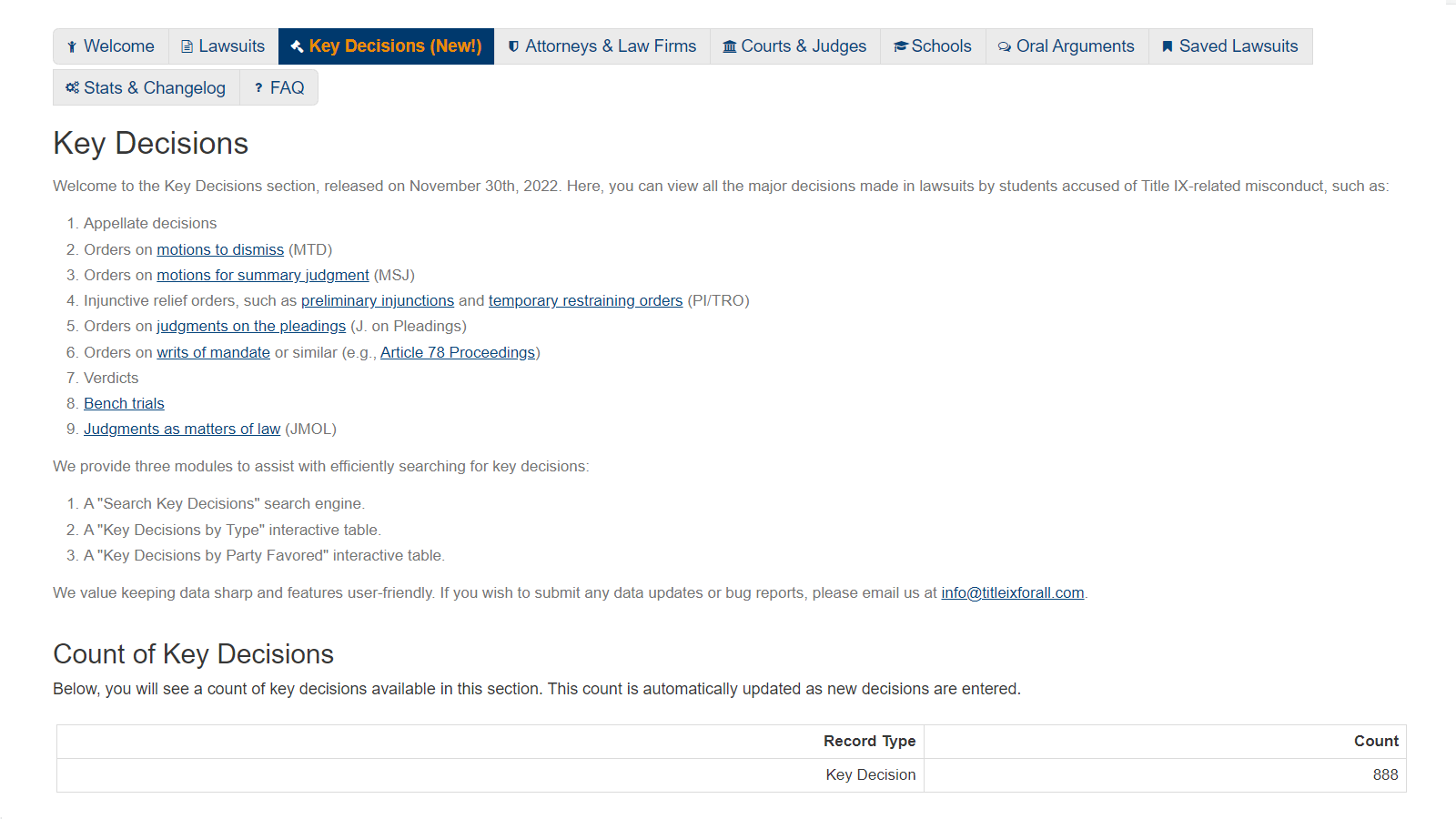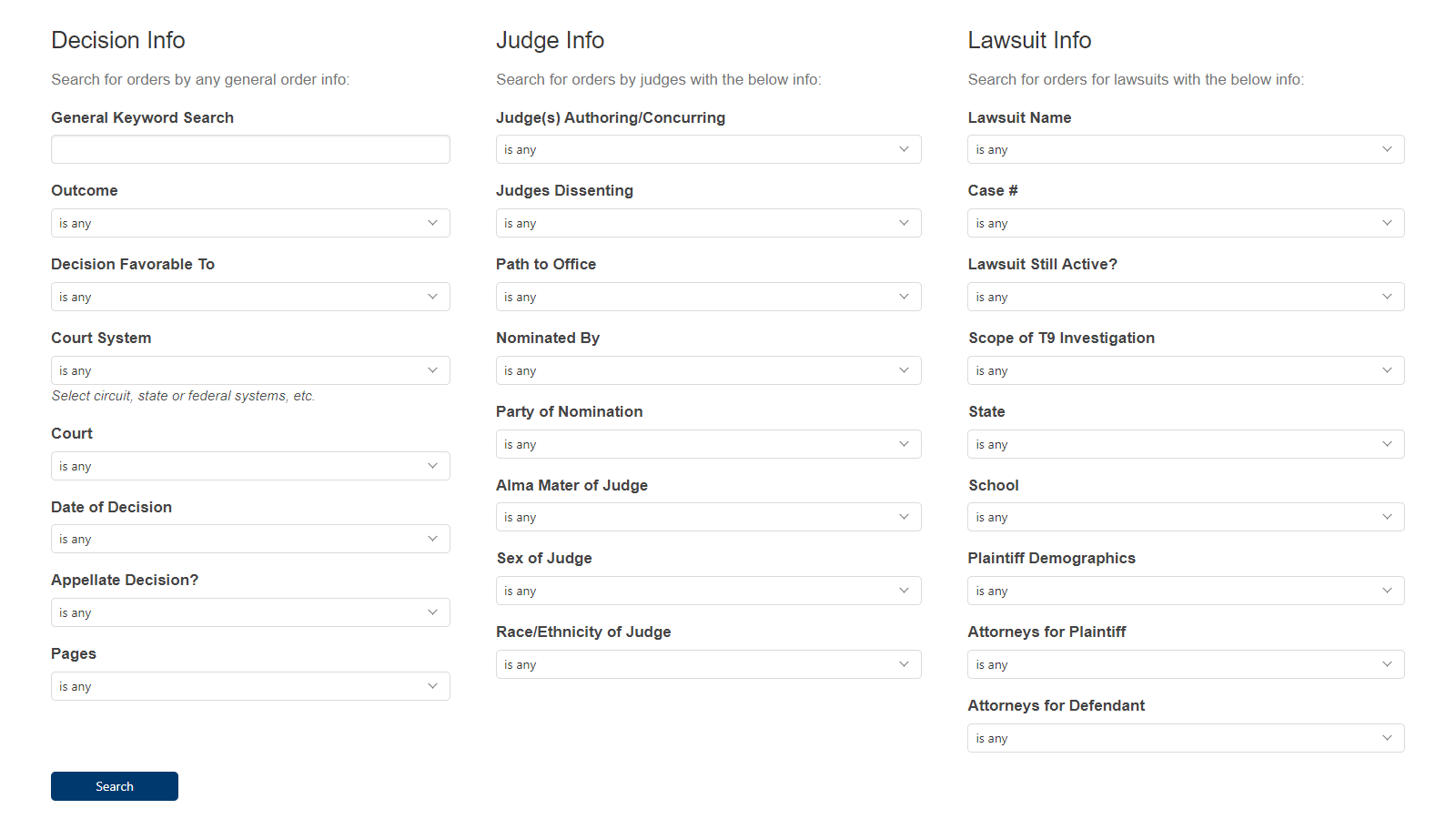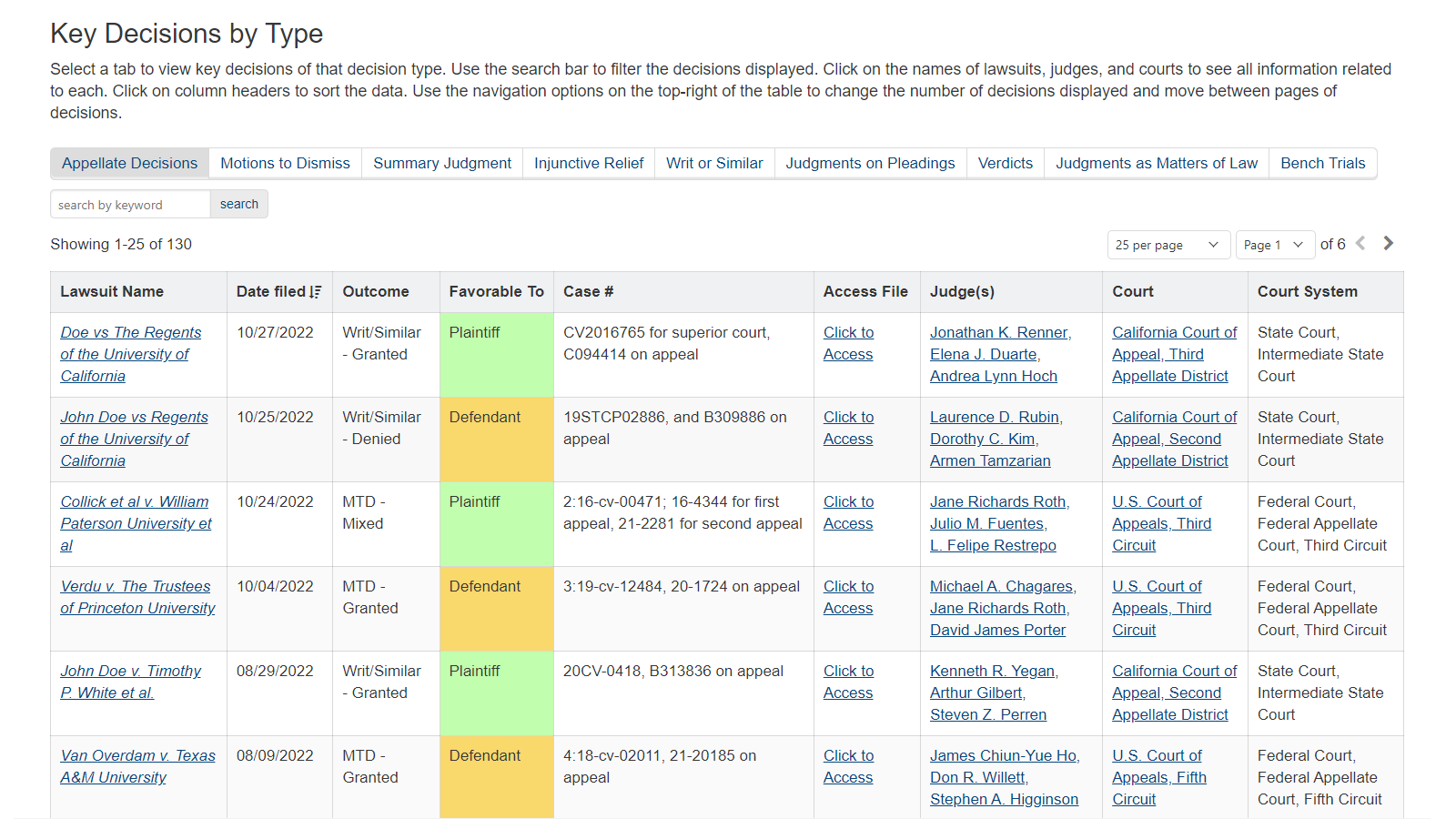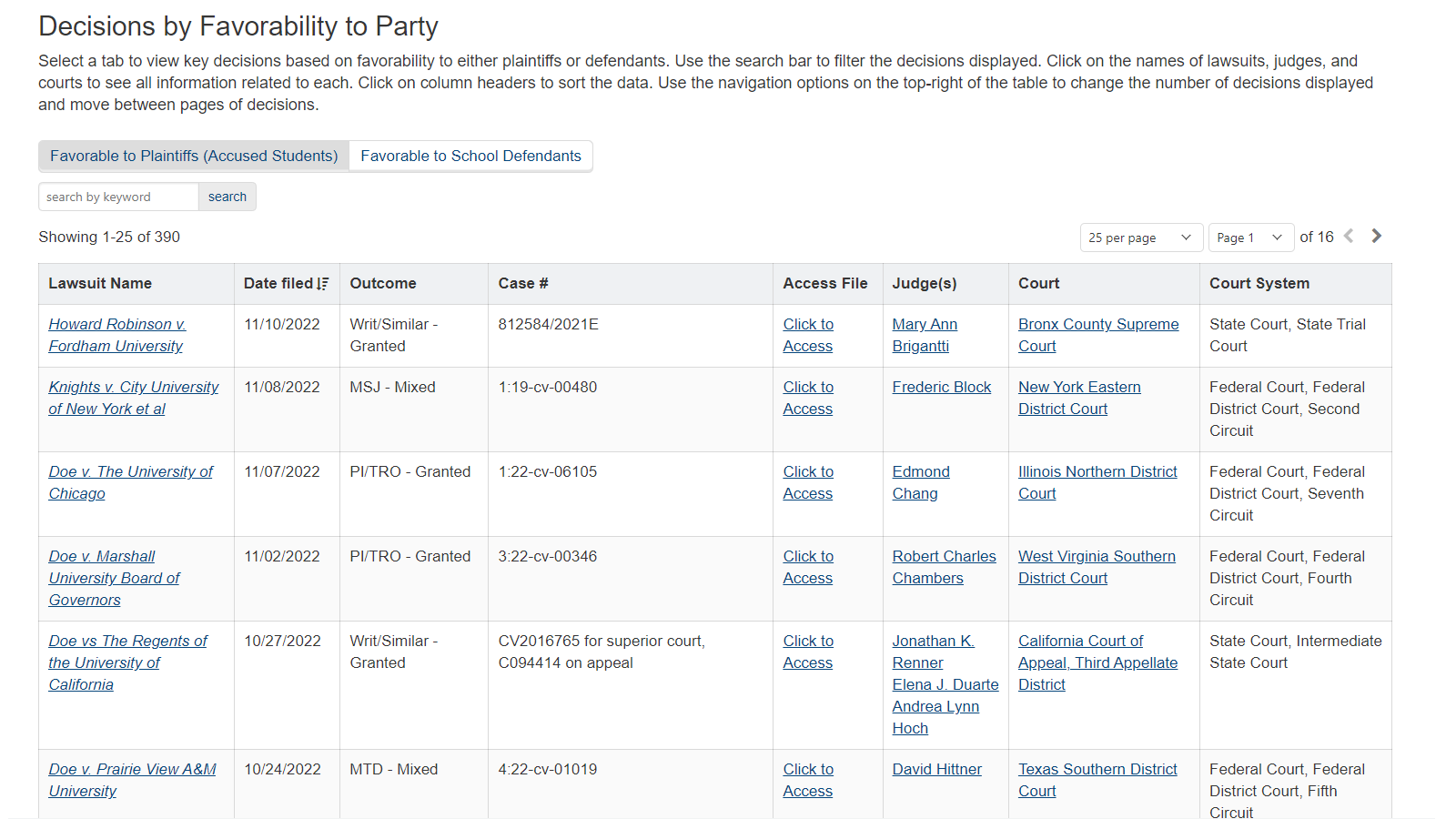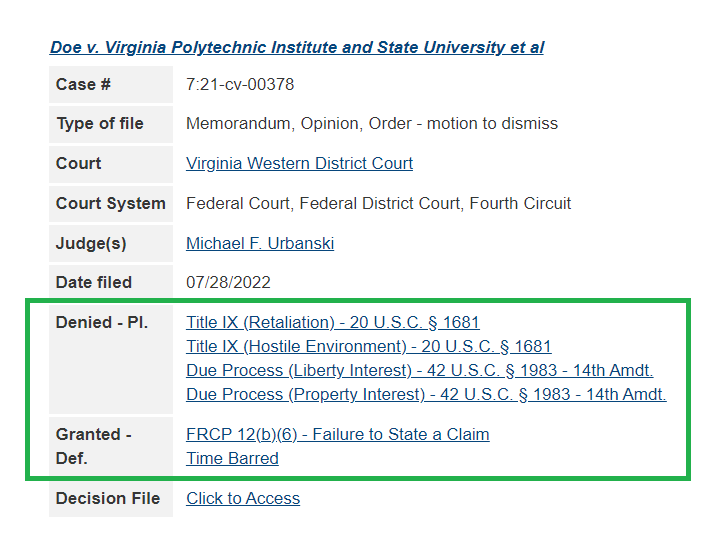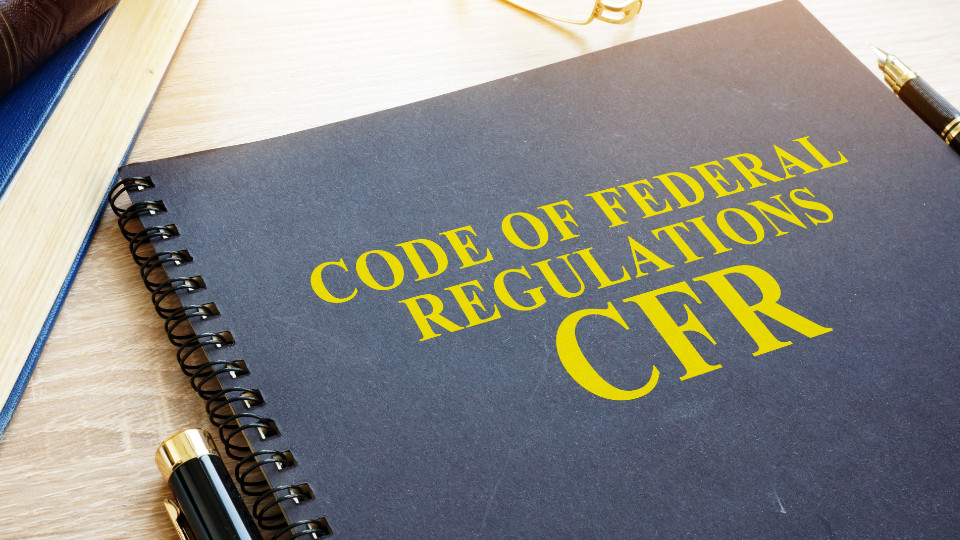We have just released the sixteenth upgrade to the Title IX Lawsuits Database, our database of lawsuits by students accused of Title IX-related misconduct. This upgrade focuses on critical judicial decisions. It is intended to fill a gap in existing features and create a stepping-stone to a larger future expansion. We’ll provide a summary of the upgrade, an overview of its features, and a preview of related future developments.
Summary
This “Key Decisions” expansion provides new tools to efficiently access key decisions in a centralized location and then sort and filter those decisions by an array of relevant search terms. It focuses on nine types of decisions:
- Appellate decisions
- Orders on motions to dismiss
- Orders on motions for summary judgment
- Injunctive relief orders
- Orders on judgments on the pleadings
- Orders on writs of mandate or similar
- Verdicts
- Bench trials (only one of these so far)
- Judgments as matters of law
As a disclaimer, we already provided these decisions as downloadable files in our database before this expansion. We currently have 888 of them across 831 lawsuits. Before this upgrade, however, accessing key decisions was considerably more time-consuming. For example, all 800+ decisions were diffused throughout the hundreds of pages dedicated to specific lawsuits. While a broad array of tools was available to search for lawsuit, judge, court, and attorney records, there was no way to view or search for key decisions categorically, in a centralized place, with search terms unique to those decisions. These functions are now possible.
Overview of Features
A new “Key Decisions” tab has been added to the main menu of the database. Clicking it will open the Key Decisions page, at the top of which is a brief overview of the types of decisions featured and links to resources to help understand the nature of each decision.
Here is a screenshot (click to enlarge):
Module one: search engine
Below the Overview section is a search engine for key decisions. Use it to search for decisions by such terms as the circuit (e.g., Second Circuit), date of the decision, the outcome (e.g., whether a motion to dismiss or a motion for summary judgment was granted, denied, etc.), whether the decision was favorable to the plaintiff or the defendant, which judges authored decisions or dissented, and many more. Here is a screenshot of the search engine (click to enlarge):
As you can see by reviewing the screenshot, there are many ways to search for judicial decisions. Our philosophy – which we apply throughout our databases in general – is to err on the side of providing more search options, even if some of those options occasionally seem tangential.
Module two: table of key decisions by decision type
Here is a partial screenshot of this section (click to enlarge):
Here, you can view all decisions categorically and navigate among them via the tabs. All decisions are color-coded by whether they are favorable to the plaintiff or defendant. The table starts by presenting all appellate decisions. Click the tabs to view all orders on motions to dismiss, summary judgment, injunctive relief, etc.
Use the search bar to filter the decisions displayed. Click on the names of lawsuits, judges, and courts to see all information related to each record. Click on column headers to sort the data. Use the navigation options on the top-right of the table to change the number of decisions displayed and move between pages of decisions.
Module three: accused student and university wins
This module is similar to the above module, except that it is a table of decisions pre-sorted by student and university wins. This table offers most of the same searching, sorting, and navigation tools as the previous table. Here is a partial screenshot of this section (click to enlarge):
In Development: Legal Theories Upgrade
The Key Decisions upgrade is a stepping-stone to a larger one that will track on a granular level the successes and failures of all the legal theories and causes of action used in litigation by accused students. These legal theories will be searchable by a myriad of methods (circuit, court, judge, etc.). The current plan is to tag all the judicial decisions with all the causes of action and legal theories that have succeeded or failed, along with some other bells and whistles. This project will have a long development cycle and will likely be released in stages.
Here is a partial screenshot to give you an idea of how we are tracking the data. The green box is the particularly relevant section.
The Key Decisions upgrade released today is the sixteenth upgrade (excluding minor upgrades) to our Title IX Lawsuits Database since its relaunch in November 2018. Thank you to everyone who supports the database and our work in general.
Thank You for Reading
If you like what you have read, feel free to sign up for our newsletter here:
About the Author
Related Posts
We have just released the sixteenth upgrade to the Title IX Lawsuits Database, our database of lawsuits by students accused of Title IX-related misconduct. This upgrade focuses on critical judicial decisions. It is intended to fill a gap in existing features and create a stepping-stone to a larger future expansion. We’ll provide a summary of the upgrade, an overview of its features, and a preview of related future developments.
Summary
This “Key Decisions” expansion provides new tools to efficiently access key decisions in a centralized location and then sort and filter those decisions by an array of relevant search terms. It focuses on nine types of decisions:
- Appellate decisions
- Orders on motions to dismiss
- Orders on motions for summary judgment
- Injunctive relief orders
- Orders on judgments on the pleadings
- Orders on writs of mandate or similar
- Verdicts
- Bench trials (only one of these so far)
- Judgments as matters of law
As a disclaimer, we already provided these decisions as downloadable files in our database before this expansion. We currently have 888 of them across 831 lawsuits. Before this upgrade, however, accessing key decisions was considerably more time-consuming. For example, all 800+ decisions were diffused throughout the hundreds of pages dedicated to specific lawsuits. While a broad array of tools was available to search for lawsuit, judge, court, and attorney records, there was no way to view or search for key decisions categorically, in a centralized place, with search terms unique to those decisions. These functions are now possible.
Overview of Features
A new “Key Decisions” tab has been added to the main menu of the database. Clicking it will open the Key Decisions page, at the top of which is a brief overview of the types of decisions featured and links to resources to help understand the nature of each decision.
Here is a screenshot (click to enlarge):
Module one: search engine
Below the Overview section is a search engine for key decisions. Use it to search for decisions by such terms as the circuit (e.g., Second Circuit), date of the decision, the outcome (e.g., whether a motion to dismiss or a motion for summary judgment was granted, denied, etc.), whether the decision was favorable to the plaintiff or the defendant, which judges authored decisions or dissented, and many more. Here is a screenshot of the search engine (click to enlarge):
As you can see by reviewing the screenshot, there are many ways to search for judicial decisions. Our philosophy – which we apply throughout our databases in general – is to err on the side of providing more search options, even if some of those options occasionally seem tangential.
Module two: table of key decisions by decision type
Here is a partial screenshot of this section (click to enlarge):
Here, you can view all decisions categorically and navigate among them via the tabs. All decisions are color-coded by whether they are favorable to the plaintiff or defendant. The table starts by presenting all appellate decisions. Click the tabs to view all orders on motions to dismiss, summary judgment, injunctive relief, etc.
Use the search bar to filter the decisions displayed. Click on the names of lawsuits, judges, and courts to see all information related to each record. Click on column headers to sort the data. Use the navigation options on the top-right of the table to change the number of decisions displayed and move between pages of decisions.
Module three: accused student and university wins
This module is similar to the above module, except that it is a table of decisions pre-sorted by student and university wins. This table offers most of the same searching, sorting, and navigation tools as the previous table. Here is a partial screenshot of this section (click to enlarge):
In Development: Legal Theories Upgrade
The Key Decisions upgrade is a stepping-stone to a larger one that will track on a granular level the successes and failures of all the legal theories and causes of action used in litigation by accused students. These legal theories will be searchable by a myriad of methods (circuit, court, judge, etc.). The current plan is to tag all the judicial decisions with all the causes of action and legal theories that have succeeded or failed, along with some other bells and whistles. This project will have a long development cycle and will likely be released in stages.
Here is a partial screenshot to give you an idea of how we are tracking the data. The green box is the particularly relevant section.
The Key Decisions upgrade released today is the sixteenth upgrade (excluding minor upgrades) to our Title IX Lawsuits Database since its relaunch in November 2018. Thank you to everyone who supports the database and our work in general.
Thank You for Reading
If you like what you have read, feel free to sign up for our newsletter here:
About the Author
Related Posts
More from Title IX for All
Accused Students Database
Research due process and similar lawsuits by students accused of Title IX violations (sexual assault, harassment, dating violence, stalking, etc.) in higher education.
OCR Resolutions Database
Research resolved Title IX investigations of K-12 and postsecondary institutions by the Department of Education’s Office for Civil Rights (OCR).
Attorneys Directory
A basic directory for looking up Title IX attorneys, most of whom have represented parties in litigation by accused students.


